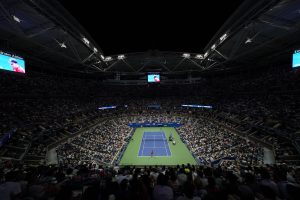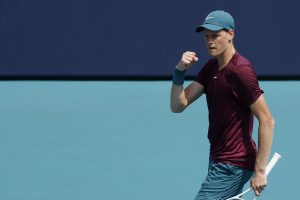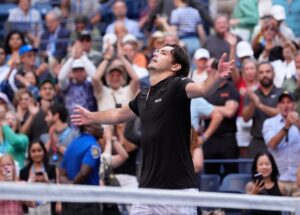There is an old cliché that even a man who could turn back time would eventually run out of it. And for Roger Federer – one of the most successful and popular sportsmen of all time – who is already late into the twilight of his glorious career, that brings with it the unwelcome prospect of an uncertain farewell. The Swiss star endured a difficult start to 2020, despite battling into the Australian Open semifinals, and has had two knee surgeries since he last stepped onto court.
Of course, his absence, which would usually be glaring, has been largely overlooked due to the coronavirus pandemic, which has torn the heart out of the 2020 season, with both tours having been suspended since February. But whilst tennis is set to resume in the coming weeks, Federer will not be back in action until January, 2021, at the earliest. By then, his two great rivals, Rafael Nadal and Novak Djokovic, may have dealt further damage to his legacy.
Federer still leads in the tally of Grand Slams won, with 20 titles to his name, but his hopes of pulling decisively clear of his challengers look slim. Indeed, with Nadal just one title behind, there is every chance that he will be caught and possible even surpassed by the Spaniard before the end of the year should tennis’ August resumption go as planned. After all, Nadal is reigning champion at both the US Open and Roland Garros. It would take a brave man to bet against him defending at least one of those titles in the coming weeks.
Djokovic, meanwhile, is also hot on Federer’s heels and yet to taste defeat in 2020. He began his season by capturing the only Major to be played so far this year at the Australian Open, beating a laboured Federer fairly comfortably in the last four. He will doubtless view the US and French Open, which are currently set to be played within weeks of each other, as an excellent chance to further reduce Federer’s lead in the Major-title count.
But will Federer be unduly concerned by this? By his own admission, the great Swiss expects to lose the Grand Slam record at some point in the future. He has been clear that it is not the chance to write his name into the record books that motivates him. Instead, as Federer told The Times: “I’m still very eager, very happy, very motivated. But I feel like I need to be able to compete with the best, that I can still win big tournaments. Like last year at Wimbledon, I was so close. I need those moments”.
Federer has also claimed that for him, the end need not be perfect. He told the Associated Press last year that he did not feel that “that you have to win something huge and you go, ‘OK. I did it all’. It can be completed a different way, as long as you enjoy it and that’s what matters to you”. However, one rather suspects that this might be little more than idle talk from Federer. He will surely still be desperate for at least one more taste of Grand Slam glory.
After all, he remains near the top of the game, despite being barely 12 months away from his 40th birthday. He has focused on preserving his body and paid close attention to his fitness throughout his career, having been working with his trainer Pierre Paganini since he was 13. Unsurprisingly, Federer’s schedule is planned meticulously, with the Swiss, for the most part, having avoided overplaying since he turned professional in 1998.
And the experienced commentator Nick Lester, who recently spoke to the Last Word on Tennis Podcast, believes that Federer will remain a contender at the biggest events next year, provided he can overcome his recent injury troubles. Lester conceded that “at 39 years of age, it is obvious to say it is going to get tougher. But the one thing that Roger Federer has always been is an optimist. The overriding sense of his personality is that he breeds optimism. Everything in his life is possible”.
“If you breakdown his game, it is a high-risk scenario,” he continued. “If you look at his average contact point on a tennis court over the last few years, it has gotten further and further inside the baseline which means he takes the ball earlier and that takes extraordinary timing. From a physical standpoint, there are not many players in the world who can play like him. The barometer for me will be two things. One, if the body holds up, and two, which is less of a question mark, is his desire.”
Lester also felt that the break due to the coronavirus pandemic could end up giving Federer some time to recharge his batteries, and perhaps in somewhat fortuitous circumstances, delay the progress and development of up-and-coming young stars in the game. For instance, the likes of Daniil Medvedev, Stefanos Tsitsipas and Dominic Thiem had been making serious strides of late. Notably, the Austrian Thiem took Djokovic the distance in the final in Melbourne earlier this year, which was his third Major final.
But all the momentum the young stars had built up in recent years will likely have been brought to a crashing halt by the suspension of the season. There is a real chance that the enforced six-month break will prove detrimental to their efforts to dismantle the triarchy that has ruled men’s tennis for the last 17 years. That said, Nadal and Djokovic will almost certainly remain formidable obstacles. But they are at least foes Federer is more than familiar with.
And it should not be forgotten that he has returned from a long-injury layoff to win fresh glory before, with the tennis he played in 2017 and early 2018 some of the finest of even his storied career. In 2020, Federer did not make much of a mark. But whilst he may be down, he most certainly is not out. So do not be surprised if in 2021 Federer weaves some more magic with his Wilson wand, if he writes one last and triumphant chapter in the long and glittering tale of his career.
Main photo:
Embed from Getty Images





